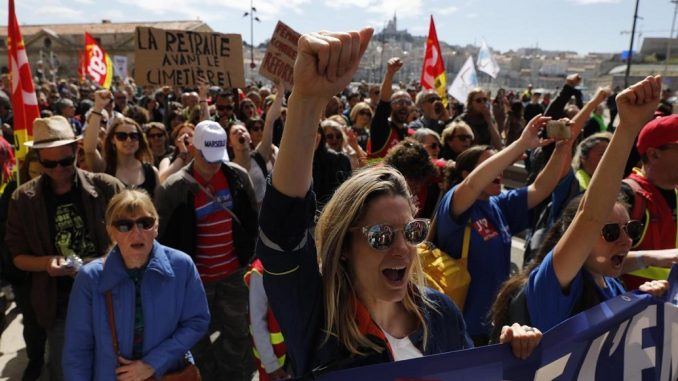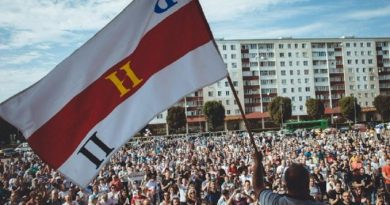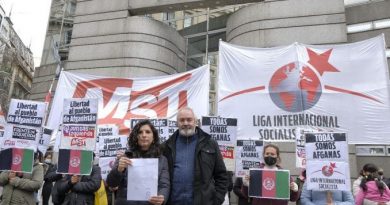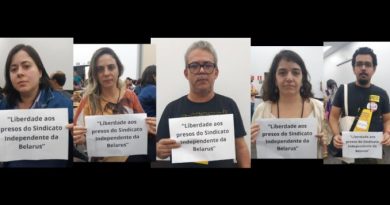France: a balance of the fight, who entered a new chapter
ByPablo Vasco
After four months of powerful fight against Macron's anti-retirement reform, it is necessary to balance the movement, the role of its protagonists, the perspectives of the situation and the tasks of the revolutionary socialists.
1. a historic movement. From the 19 from January, France experienced twelve national days of struggle, with massive strikes and demonstrations, against the reactionary reform of the Macron government and the capitalists it elevated from 62 a 64 years the retirement retirement age and 37,5 a 43 the years of contribution to collect the full amount. The enormous social force deployed in this process confirms its historical character., comparable to other milestones such as the movements against the Juppé Plan (1995), First Job Contract Law (2006) and the labor reform (2016), and superior to the fight of the yellow vests (2018).
The strikes were majority among the railway workers and the rest of public transport, oil refiners, electricity and garbage collectors; strong in teachers, chemicals, health and other sectors, and partial in other activities. The marches were of an unprecedented massiveness, even in small towns, with peaks of 3,5 millions of people in 400 towns all over France. Workers participated -many for the first time-, students, retirees and popular and middle sectors. During the conflict there were also firmer actions: pickets and strike funds, blockades of oil tanks, ports and routes; occupations of the Paris Stock Exchange and other public offices; stadium power outages, airports, municipalities and parliamentary meetings, and heavy clashes between protesters and police.
2. The continental and local framework. The French process against the pension reform was preceded by a powerful wave of worker strikes and mobilizations in Great Britain, in clear recovery after almost four decades since the defeat imposed by Thatcher in 1985. Apart from strikes and conflicts in Germany, Spain, Italy, Belgium, Portugal, Greece and other European countries, the British and French movements are the vanguard of the struggle in the Old Continent and express the arrival on the scene of one of the main battalions of the world working class.
As for France, since last October there have been numerous strikes whose central claim was that of a wage increase: railway, bus drivers, refineros, airport operators and several private companies. Low wages, poor working conditions and understaffing in public services, as well as the annual inflation of 8%, which in food reached the 15%, are the main reasons for the strong social discontent that had been accumulating against the government and its austerity plan at the time of launching the reform project.
3. A weak government, but authoritarian. Taken up in May 2022 after a ballot against the far-right Le Pen, Macron is a president considered "badly elected" since he only obtained one 38,5% of the national register and with a record abstention. His capitalist-imperialist government lacks its own parliamentary majority and depends on alliances with other blocs., that vary from case to case. Even so, with the support of big employers (Medef) is determined to move forward with its anti-worker measures (pension reform), antipopulares (cuts to social areas and unemployment benefits), anti-juveniles (regimentation via a “universal national service”) and anti-immigrants (increased requirements and immediate expulsions, laws under debate today). The government of Macron and his Interior Minister Darmanin is increasingly authoritarian. If the French bourgeois-democratic regime is already very presidential, Macron accentuated his Bonapartist features.
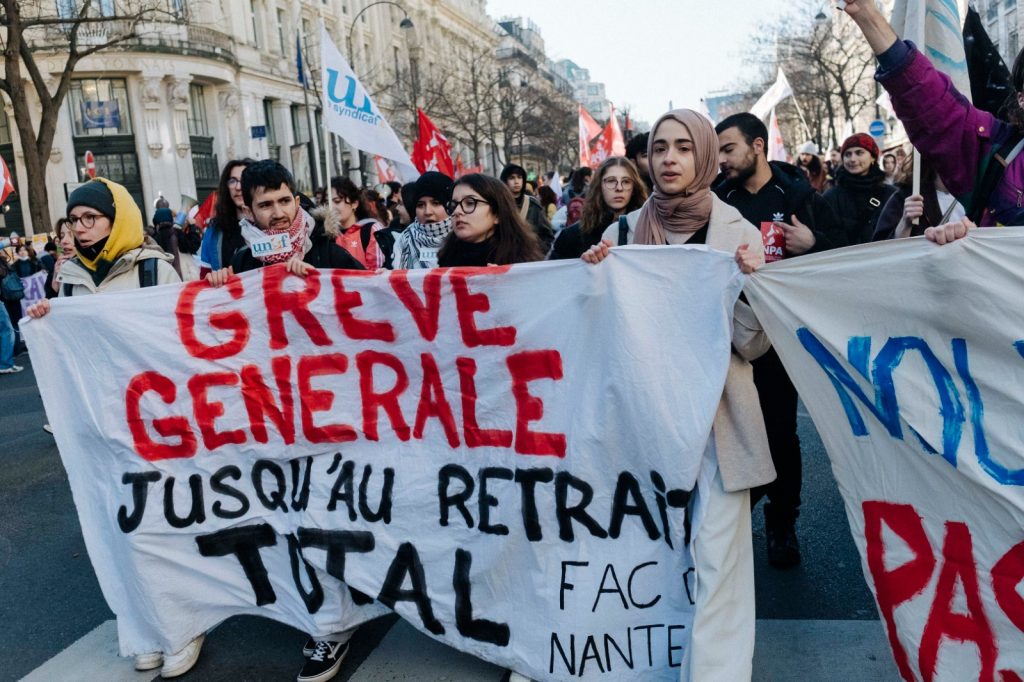
He imposed his pension reform via anti-democratic decrees to limit the debate in the Senate (art. 47.1 Y 44.3) and pass over the National Assembly (art. 49.3). The Constitutional Council validated it and twice rejected the option of a referendum, that the institutional left proposed (Melenchon, LFI) and the extreme right (The pen, RN).
Macron criminally intimidated sectors of strikers. He applied harsh police repression, with dozens of wounded and hundreds of detainees and prosecuted, even minor. The same before the environmentalist fight of Sainte-Soline, in the west of the country. Threatened human rights organizations, environmentalists and anti-repressive. Restricted the right to demonstrate. went up a 30% the military budget. And he ordered a repressive operation on the island of Mayotte, French colony in the Indian Ocean, against immigration from the sister Comoros Islands.
4. The Intersindical and the new direction. The pressure of the worker bases forced an unprecedented unit of the eight national centrals in the Intersindical. Even without overflows, had to call twelve days of strike and mobilization, plus that of May 1. But since his line was to pressure the government to decompress, called in a skipped manner without ever including the wage claim or going on strike for an indefinite period of time that would have allowed defeating the reform and the entire adjustment by Macron and the employers. The march of May 1st, that since 14 years was not unitary, it was massive. Now it is preparing to resume the "social dialogue" with the government, although he has called for a new national day of struggle for the 6 of June, prior to the parliamentary debate of a project to repeal the reform. Already in 2006 the mobilization forced the repeal of the precarious CPE law approved a few months earlier.
A weakness of the movement was the low level of self-organization of the vanguard and the strikers themselves. In general, the general assemblies were few and little attended. with inequalities, In several cities and trade union sectors, pickets arose, action committees and interprofessional coordination bodies, like AG Interpro 92 (Hauts de Seine, west paris suburb). But they did not reach a sufficient development and extension to allow them to overwhelm the bureaucracy of the Intersindical. Even so, the relative distrust of delegates and grassroots activists was expressed in the CGT, the center with the most tradition and social weight: in their tense congress last March, for the first time in its history, by a slight majority the official balance was rejected and the secretary general was replaced by an unexpected candidate. CFDT, the most numerous central and most played to class collaboration, also replaced their leader with a woman.
The student body was incorporated into the movement increasingly and, in addition to motorizing own actions, It is a vanguard in the anti-repressive marches. At the university level, a National Student Coordination emerged, with delegates from 45 institutions and motions voted in assemblies. The traditional federation UNEF, led by PS, broke up and a sector joined the centers and student groups gathered in L'Alternative to create a new national federation with a combative tone: the student union. And the high schools resumed their usual method of blocking their schools.
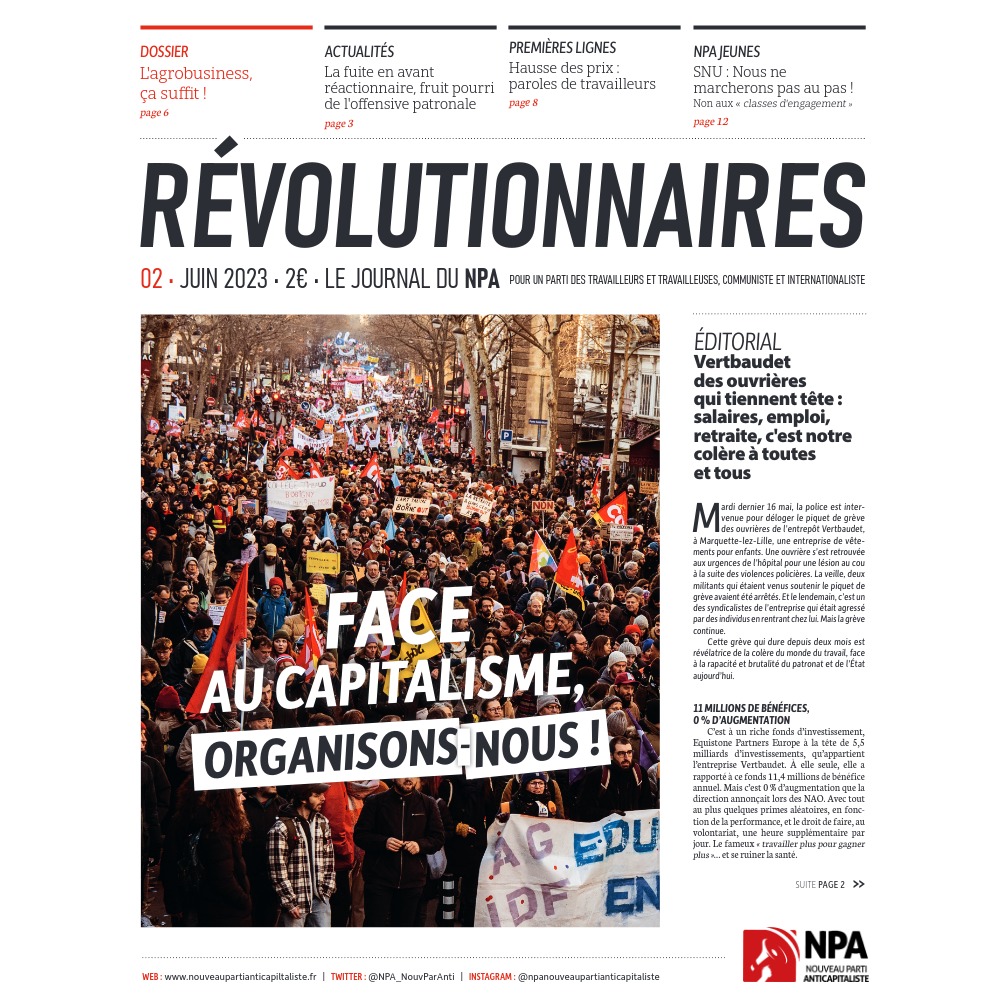
6. The politicization of the conflict. Although sectoral struggles persist, especially for wages, the overall process entered an ebb phase. Of an initial character rather vindictive anti-reform, the fight became politicized to aim more jointly against Macron, his government and the entire capitalist adjustment plan. In the marches they sang"Macron's resignation" O"Get out Macron". Today the president and his ministers cannot attend a public event without suffering saucepans, protests or repudiations. The photo of the presidential procession in the middle of an empty Parisian avenue on 8 of May, anniversary of the end of World War II, illustrates well that isolation and political crisis.
This politicization implies that the working class has gained awareness and confidence in its own strength.. Unionization grew for the first time in decades, with some 100.000 new affiliates. Both, in the worker and student vanguard, especially in thousands and thousands of young activists who have become radicalized, and in grassroots sectors, there are changes in the head and the illegitimacy of the government is debated, the political regime of the Fifth Republic and the capitalist system; the economic crisis, the crisis of this authoritarian democracy and what solutions are there; the role of unions; environmental deterioration; the possibility or not of revolution and socialism, all very political issues.
In a framework of global polarization, it is possible that part of the discontent can be channeled by Le Pen, who already promised that if he were a government he would submit this "unfair and useless" reform to parliament or a referendum. There were also some neo-fascist attacks on pickets and union and leftist premises, and recently a march of 500 hooded in paris, risks not to ignore. Meanwhile, the LFI institutional left alliance supported the movement and recovered somewhat, but its axis is to make parliamentary opposition, He has internal leadership disputes and in the polls he is still behind Le Pen.
7. The debates in the revolutionary left. In general, the entire extreme left participated in the fight, denounced the government, criticized the union bureaucracy and proposed a general strike. But several currents did so conditioned by their political framing, that we believe wrong. Workers' Struggle, who has union membership but shortly before the conflict insisted on the "regression" of the working class, acted defensively and propagandistically. Nor did the depressed Mandelist sector of Poutou and Besancenot have any initiative, responsible for the attrition of the NPA, that in the congress at the end of last year divided the party to go after LFI, and in keeping with this, he proposes a Constituent Assembly as a way out..
A separate paragraph deserves Permanent Revolution. Two years ago he left the NPA alone, instead of staying and working with the other internal revolutionary tendencies, which would have allowed them to win together the leadership of that party in congress. During the conflict he set up his own "network for the general strike", outside the genuine union coordinations. He tried the same at the student level. And although at one point he characterized "a latent pre-revolutionary situation", what is a valid debate, proposed a limited way out of the “radical democracy” type. All of RP's actions are sectarian, self-proclaimed and divisive, as do its international current and its mother party in Argentina, PTS, within the Left Front.
The revolutionary wing of the NPA, party in which our comrades from the LIS France are active, intervened in the movement promoting the real instances of union and student coordination -with a leading role in the CNE-, and calling to defeat the reform, Macron and the entire capitalist plan. As a fundamental solution, they propose a government of the workers and socialism based on the self-determination organisms of the class. In the process of struggle and the political crisis that continues, new militants are gaining. It is one more step in the enormous political task that remains posed in France in the coming period: build a revolutionary socialist leadership, a party that regroups the revolutionaries and advances as a power alternative in the face of future crises.

